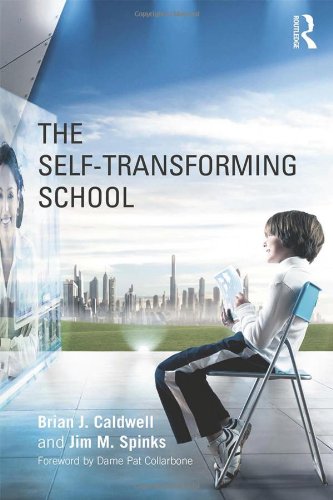

Most ebook files are in PDF format, so you can easily read them using various software such as Foxit Reader or directly on the Google Chrome browser.
Some ebook files are released by publishers in other formats such as .awz, .mobi, .epub, .fb2, etc. You may need to install specific software to read these formats on mobile/PC, such as Calibre.
Please read the tutorial at this link. https://ebooknice.com/page/post?id=faq
We offer FREE conversion to the popular formats you request; however, this may take some time. Therefore, right after payment, please email us, and we will try to provide the service as quickly as possible.
For some exceptional file formats or broken links (if any), please refrain from opening any disputes. Instead, email us first, and we will try to assist within a maximum of 6 hours.
EbookNice Team

Status:
Available4.3
32 reviewsThe Self-Transforming School combines an insightful meta-analysis of factors contributing to the success of schools, and an examination of powerful mega-trends that are shaping developments in education, to offer the first mega-analysis in education policy and practice. The book spans fifty years, beginning with Caldwell and Spinks’ ground-breaking work The Self-Managing School which advocated innovative approaches that are now accepted as preferred practice, before offering a prognosis and plan for the future.
The book argues that all schools in all settings can secure success for all students in an era where society and the economy are changing constantly and dramatically. Although schools find some support in local and global networks, externally designed re-structuring, re-staffing, or command-and-control direction isn’t sufficient to achieve transformation. Instead of replicating particular approaches to achieve modest improvement, leadership of the highest quality needs to be deeply embedded in schools and their systems. Caldwell and Spinks propose three important points that need to be taken into consideration:
-schools are often at different stages of self-transformation
-self-transformation requires a high level of professionalism, and must include teacher education and on-going professional development
-funding is critically important, and efforts to build a capacity for self-transformation are constrained by what is available.
The book gives particular attention to developments in Australia, Brazil, Canada, England, Finland, Hong Kong, India, New Zealand, Shanghai, Singapore and the United States. It will be of key interest to school leaders, policy makers, and academics and postgraduate students engaged in research on equity, student performance in highly disadvantaged settings and education policy.